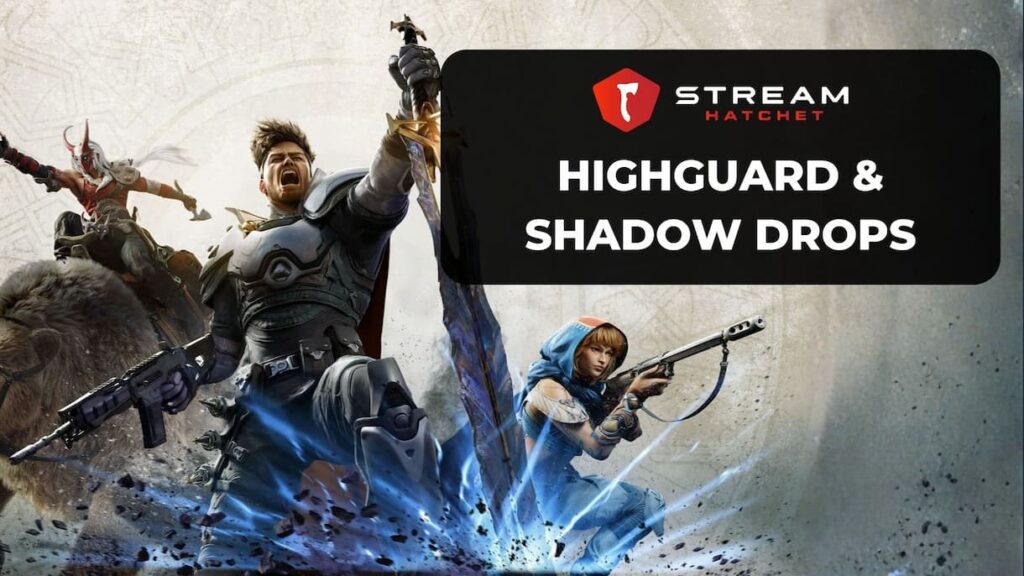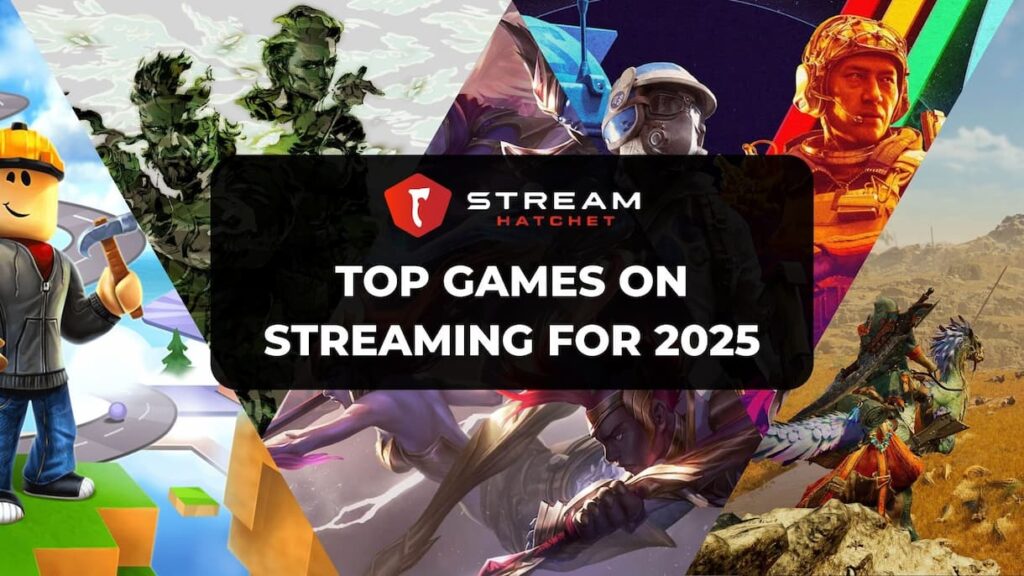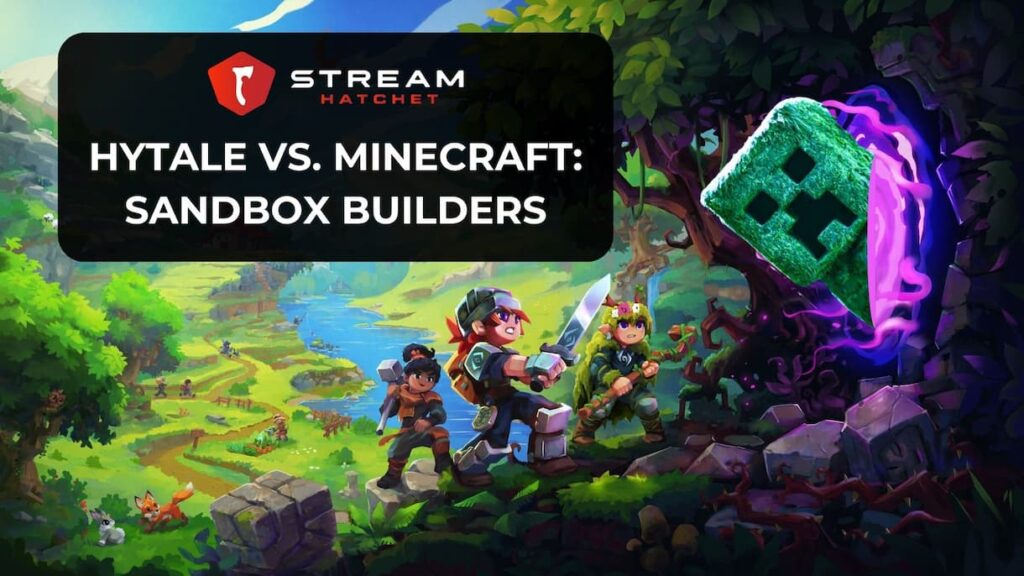Simulator games are a diverse video game genre, attempting to replicate a vast array of real-life activities. From small-scale tasks like driving a car to complex interconnected projects like managing a rail network, simulator games traditionally aim for realism in their constraints.
It’s odd then that these simulator games, which seem geared towards technical gamers and professionals in training, have exploded in popularity among streamers and their fans. Ever since the streaming success of the Euro Truck Simulator series and parodies like Goat Simulator, any game including “Simulator” in the title immediately grabs streamers’ attention. The most recent example of this phenomenon is Supermarket Simulator, which puts players in the shoes of a grocery store manager as they expand their small business.
Given the promotional power of this one word then, it’s worth delving into the specific popularity of games marketed with the word “Simulator” in their titles. Supermarket Simulator is performing exceptionally well, but it also dredges back up an age-old discussion among gamers: What exactly defines a simulator game?
Supermarket Simulator Playthroughs Flood Streaming Platforms Upon Release
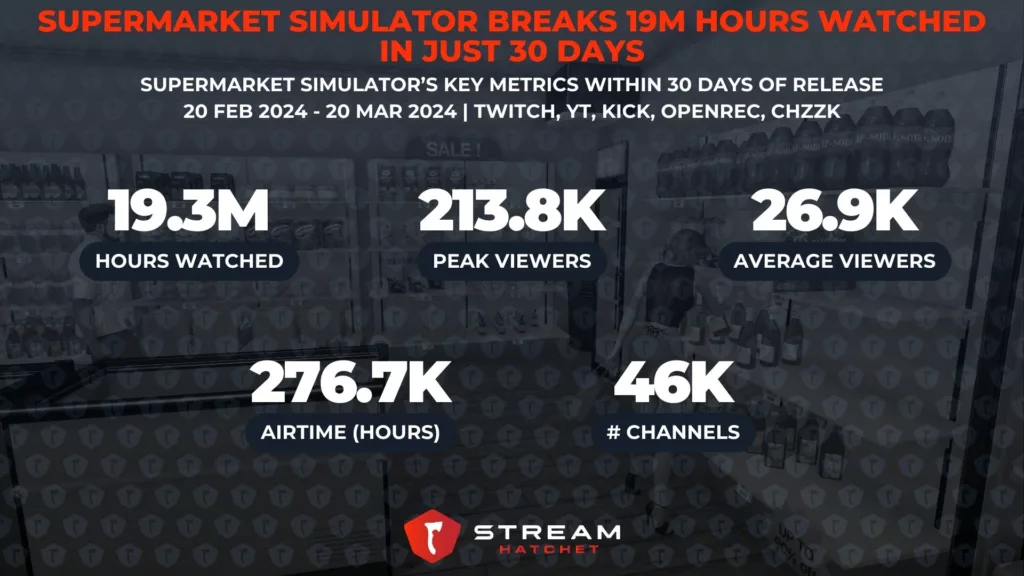
Supermarket Simulator’s early access release on the 20th of February saw an immediate positive reception from the streaming community. Across all streaming platforms, Supermarket Simulator generated 19.3M hours watched in its first 30 days, with 46K channels creating content from the game. This level of engagement is typically reserved for AAA titles with well-known IPs, like the recent success of Final Fantasy VII Rebirth. This turnout demonstrates the power of the “Simulator” label in generating hype among streamers.
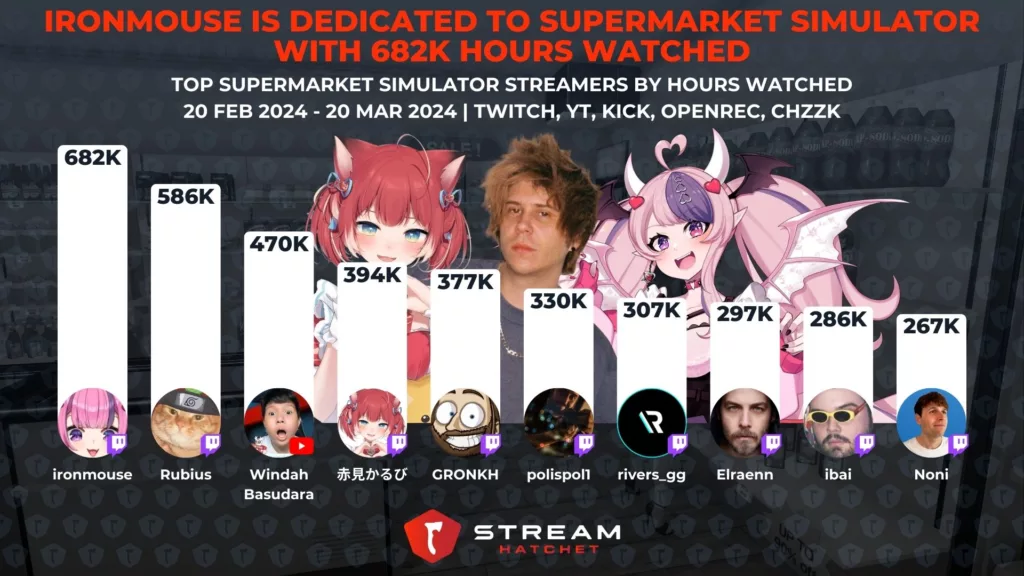
The list of people playing Supermarket Simulator features some of the most popular streamers in the world. VTuber ironmouse leads the pack with 682K hours watched across her 74 hours streaming Supermarket Simulator. Ironmouse has jumped from strength to strength over the past year, having won Content Creator of the Year at The Game Awards 2023. A lot of big-name Spanish-speaking streamers have also been playing Supermarket Simulator, including ibai, rivers_gg, and Rubius. However, it was polispol1, a lesser-known Spanish-speaking streamer, who was most dedicated to Supermarket Simulator with 77 hours streamed.
Although games labeled “Simulator” are known to be popular, there must be a reason why Supermarket Simulator in particular took off. The game’s simplicity may be the key: You have a routine gameplay loop of stocking your store, managing it during the day, then upgrading it with expansions and new stock. There’s not much to Supermarket Simulator – which makes it perfect for streaming. Streamers can easily chat with viewers over the top of the gameplay while the store’s gradual improvement rewards the audience’s interest.
Vehicle Simulators Captivate Streaming Audiences
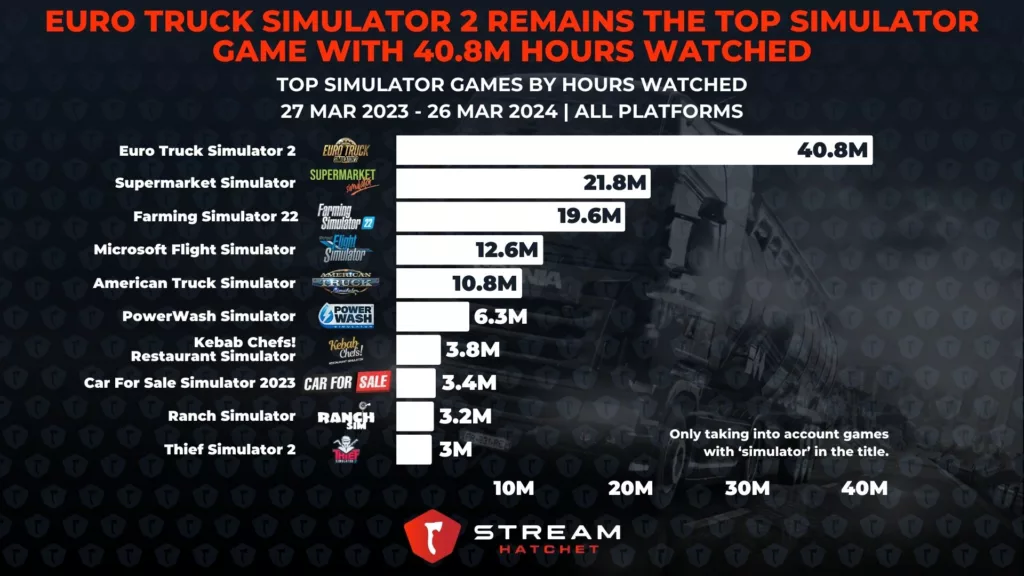
By far the most popular simulator game over the past year is Euro Truck Simulator 2, with 40.8M hours watched over 1.9M hours aired. In fact, four of the top five simulator games over the past year are based around driving vehicles. There could be many explanations for this: Firstly, these driving games induce the same meditative gameplay conducive to chat participation as mentioned for Supermarket Simulator. Secondly, they have an additional bonus: Getting to explore the world. The success of GeoGuessr can also be attributed to viewers’ desire to travel from the comfort of their homes.
Supermarket Simulator is the exception, cracking into the Top 10 at #2 with 21.8M hours watched – an incredibly impressive performance for a new IP. Keep in mind that the only game beating it, Euro Truck Simulator 2, has been out for almost 12 years now. When looking purely at the first 30 days of release for each of these games, Supermarket Simulator has the #1 debut 30-day performance of any simulator game.
More Simulator Games Are Being Released Than Ever… But Demand Isn’t Following
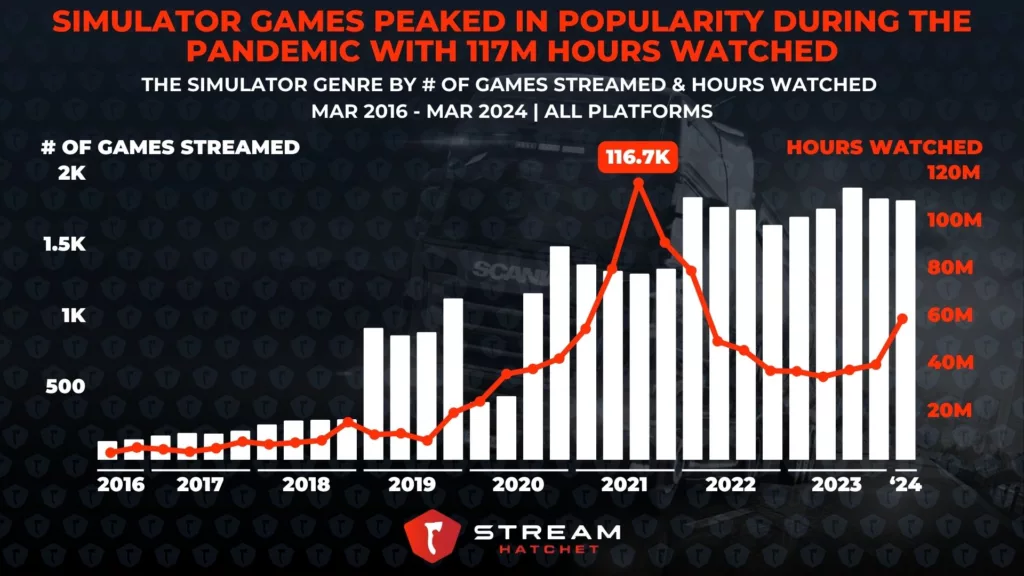
Despite the breakout success of Supermarket Simulator, a wider look at the popularity of streaming games suggests they may have already had their heyday. During the later stages of the pandemic, simulator games were massively popular with a peak of 117M hours watched in the third quarter of 2021. This gels with the general rise in popularity of most games on streaming platforms due to the pandemic.
More curiously, however, viewer interest in simulator games waned while the number of simulator games being streamed continued to rise. In the third quarter of 2023, a peak 1.9K simulator games were streamed but only 38M hours were watched – dropping to just 32% of the peak viewership in 2021. It could be that creators kept engaging with simulators in an attempt to recapture the magic of the pandemic-era highs.
Alternatively, creators may have simply developed a new relationship with simulators, returning to them sporadically for more conversational streams. The continued popularity of simulator games among creators makes sense: The wide variety of simulator games allows everyone from hardcore enthusiasts to casual idlers to enjoy the genre. After all, there’s a world of difference between the 1:1 correspondence of Microsoft Flight Simulator and the more casual integration of real life constraints in PowerWash Simulator.
Simulator Subgenres Attract Unique Sections of the Streaming Audience
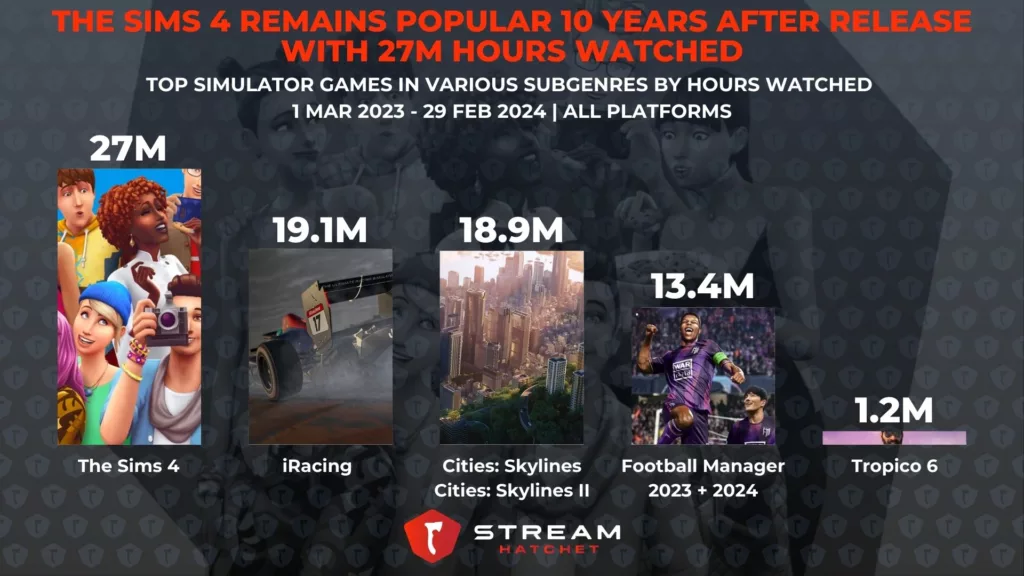
So far, the discussion has been focused entirely on games deliberately including “simulator” in their titles. But of course, there are many more simulator subgenres beyond these stereotypical examples. Since the genre’s origin with 1964’s text-based economy simulator The Sumerian Game, a plethora of activities have been replicated in simulator form: Farming, managing, dating, city-building, driving, politicking, and even streaming itself.
Developer Maxis is often credited for popularizing the simulation genre, with their hit series SimCity and The Sims. Even 24 years on, The Sims 4 is proving the concept’s longevity with 27M hours watched over the last year. City-builders and sports managers also hold an appeal for players with a mind for organization, as shown by the recent success of the Cities: Skylines and Football Manager series which generated 19M and 13M hours watched each over the last year. Sim racers enjoyed growing popularity during the pandemic, with some like iRacing maintaining this momentum.
With so many simulator games, parodies were bound to pop up. Perhaps the most infamous parody simulator is Goat Simulator, a game that overwhelmed YouTube Let’s Play content upon its release in 2014. Goat Simulator mocked many of the core concepts which hardcore simulator game enthusiasts held sacred by introducing impossible physics in absurd scenarios. Even in a genre with so little to define it, parodies further expanded the potential of simulator games.
Given their near-infinite diversity and the relatively inexpensive cost of production, developers will no doubt continue to create more simulator games. As long as the genre keeps reinventing itself through more advanced mechanics, different types of content, and parodies, streamers and their fans will likely continue to engage with simulators. Stream Hatchet will continue tracking the popularity of simulator games as new trends emerge.
To track the biggest games and genres in streaming, follow Stream Hatchet:

